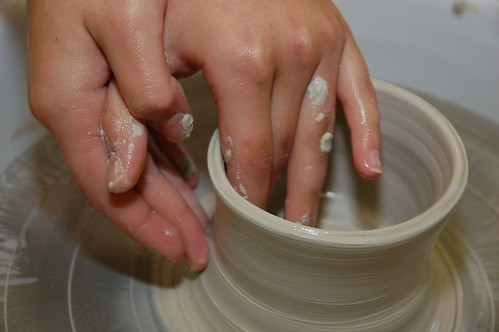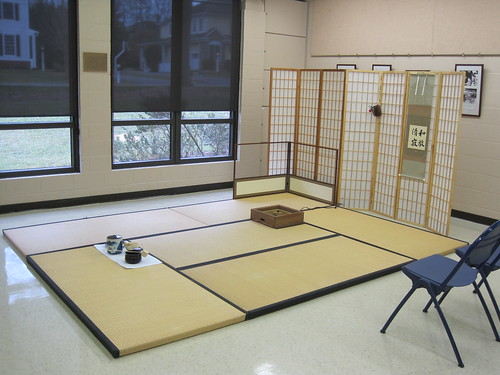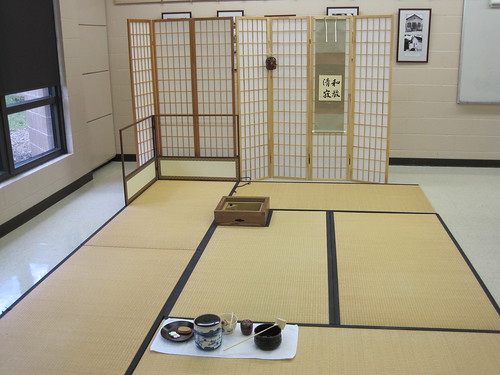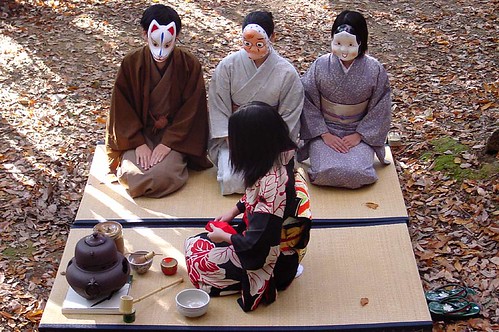By 11:00 AM yesterday, I had definitely had enough new experiences that I was in theory ready to head home and call it a day. There were still eight solid hours of time to be spent at the Tea school though, so I couldn't begin to reconstruct my day in a meaningful or comprehensive way this morning.
I first arrived at the school on Tuesday. On Thursday, some of the students of the program I am visiting are hosting a chaji.
According to http://wiki.chado.no/Chaji, a chaji is "a tea gathering during which the host serves food and sake in addition to Koicha and Usucha. A chaji takes several hours to complete." Koicha is a thick, syrupy green tea, and usucha is the less formal, more famous whisked green of Tea ceremony.
The day that I arrived, there was a change in the normal schedule. Instead of regularly planned lectures in the morning, we took a "field trip" to Toinseki, a tea house that I believe is attached to the grounds of a Buddhist temple. This is where the chaji will take place on Thursday.
Just typing "Toinseki" into Google provided me with the blogs of a number of Westerners who have attended this Tea school, so here are some pictures of the teahouse that somebody took.
***
After a walk-through and an explanation of what everyone will do tomorrow (I'm on kitchen duty), we returned to the school for lunch and afternoon Tea practice. I was placed with the kohai group - the students who began studying here in April rather than last September. They were performing a particular style of thick Tea, wherein the tea is kept in a thin tea container that is tied up in a special silk pouch. Then at the end of the lesson, we all played a Tea game called ha-getsu (flower-moon) in which we went through a Tea session with frequent stops to draw lots and determine who was going to take charge of the next part of the program.
After this was dinner, followed by evening cleaning. Everyone else then left to prepare for aspects of Thursday's chaji, and I headed out to purchase some necessities and groceries.
I hope that the jetlag keeps up for a while, because early-to-bed, early-to-rise seems like the only way to make this program work. Whew! And I'm just a short-term visitor with comparatively light expectations.
Today, it's lectures in the morning and an afternoon of cleaning up the tea house and the surrounding gardens. Tomorrow, it's the chaji. Friday, I get to find out what a "normal day" looks like.
On the Tea Derekh
Chanoyu, Judaism and an Ongoing Quest for Meaning
(Or, An Attempt to Maintain the Most Esoteric Blog on the Internet)
Tuesday, June 26, 2012
Monday, June 25, 2012
First night
Last night was the first of 13 that I expect to spend in Kyoto.
The flights and to/froms all went very smoothly. This is great, as I believe there were enough moving parts to the whole trip that any snafus would have caused some major problems along the way. The first leg of the journey was nothing but long, Dulles Airport -- Narita, but after that is was Customs -- Connecting domestic flight -- Baggage -- Shuttle bus to Kyoto -- Taxi to Guesthouse. I arrived at the guesthouse about 15 minutes before check-in ended, so all was well.
(A note to the wise, or at least to those who want to be prepared. If your Japanese location offers you a map on their website, print out the map and bring it along. It wasn't a problem for the taxi driver to call the guesthouse to ask for directions, but they offer those maps for a reason.)
I am staying at a guesthouse called Itoya, which, much to my enthusiasm, looks just like the pictures on the website. The real strength of the place is that it is about a 15-minute walk from the Tea Center where I will be studying this week and next. I am staying in a room called "the girls' dormitory," which is two bunks of beds in a very small space. This sounded like a reasonable setup to me because the English language version of the site is "Under Construction." As a matter of stereotypical expectation, I figured that sharing a room with a number of Japanese strangers would be much less invasive and loud than sharing a room with a bunch of Americans or other foreigners on holiday.
Also, the shared room arrangement brings cost down to just over $25 a night for a very nice little place to stay. With free WiFi.
Thanks to the free WiFi, I arrived last night and found this message waiting for me from my contact at the Tea school:
Subject: short notice
Mina,
Hooray for the internet. (I was otherwise planning on arriving early for the day, but at about 9:00AM.)
Curious to learn a little about this Toinseki teahouse, I found this from a quick Google search. It seems to be the blog of someone who is attending the year-long version of the program that I'm visiting for a fortnight.
And now, with a business-card map and address for the guesthouse in my pocket, I am off!
The flights and to/froms all went very smoothly. This is great, as I believe there were enough moving parts to the whole trip that any snafus would have caused some major problems along the way. The first leg of the journey was nothing but long, Dulles Airport -- Narita, but after that is was Customs -- Connecting domestic flight -- Baggage -- Shuttle bus to Kyoto -- Taxi to Guesthouse. I arrived at the guesthouse about 15 minutes before check-in ended, so all was well.
(A note to the wise, or at least to those who want to be prepared. If your Japanese location offers you a map on their website, print out the map and bring it along. It wasn't a problem for the taxi driver to call the guesthouse to ask for directions, but they offer those maps for a reason.)
I am staying at a guesthouse called Itoya, which, much to my enthusiasm, looks just like the pictures on the website. The real strength of the place is that it is about a 15-minute walk from the Tea Center where I will be studying this week and next. I am staying in a room called "the girls' dormitory," which is two bunks of beds in a very small space. This sounded like a reasonable setup to me because the English language version of the site is "Under Construction." As a matter of stereotypical expectation, I figured that sharing a room with a number of Japanese strangers would be much less invasive and loud than sharing a room with a bunch of Americans or other foreigners on holiday.
Also, the shared room arrangement brings cost down to just over $25 a night for a very nice little place to stay. With free WiFi.
Thanks to the free WiFi, I arrived last night and found this message waiting for me from my contact at the Tea school:
Subject: short notice
Mina,
We will be going to visit the Toinseki teahouse tomorrow, so could you come to the Urasenke Center at 8:45? We will be going in western clothes. Yes, you are right, yukata is not appropriate in this situation.
If you are not in Japan yet, have a good trip. If you are already here, welcome.
See you tomorrow.
Hooray for the internet. (I was otherwise planning on arriving early for the day, but at about 9:00AM.)
Curious to learn a little about this Toinseki teahouse, I found this from a quick Google search. It seems to be the blog of someone who is attending the year-long version of the program that I'm visiting for a fortnight.
And now, with a business-card map and address for the guesthouse in my pocket, I am off!
Thursday, June 21, 2012
Stepping out to see inside
One phrase that comes up early in the book The
Search for God at Harvard by Ari Goldman is a religion professor’s
credo, “If you know only one religion, you know none at all.” I don’t recall
whether my understanding of this phrase is based on the book’s explanation or
my own thinking about it, but here is my take.
There is a framework to what religion is, what
areas of life it touches and what its goals are. There is also a framework that
describes each individual religion. These frameworks all overlap, but to think
I understand religion in general because I understand my own religion, that’s
just wrong-headed.
The best example I can think of for this is a Jewish
friend who enjoyed discussing religion with a Christian coworker. One day she
asked him a question that had been bothering her for some time. “How do Jews
get saved?” The dominant purpose of her Christianity was to achieve salvation,
and so salvation was to her a central religious value. Judaism is a religion, so
how do Jews get saved?
Okay, my understanding of the original religion-professor
comment is shaky at best, but if you changed the word “religion” to “language,”
I would be in complete agreement.
As a freshman in college, I was looking over majors and
had the unusual experience of feeling deeply annoyed by the linguistics major.
The reason for my annoyance was because the linguistics major required a
certain level of Latin and of Greek, as well as two semesters of a Romance
language of your choice. There were no other language requirements beyond that.
How shortsighted, I thought.
At that point I had been studying Japanese for a year,
and a major attractor for me was the desire to study a language that was as
dissimilar to English as possible. I had taken French throughout high school
and thought, flippantly, that it was basically highfalutin English with a funny
accent.
By learning Japanese, I felt that I had additional
insight into what a language could be. The subject of a sentence can be
implied! You can conjugate by person-number-gender, or you can conjugate by
politeness levels! Does it even matter what order you use for the different
parts of the sentence? Maybe not!
This little-vision linguistics major, I decided, had it
all wrong. By the end of the major you might be able to say what Romance
languages are, and you would know how Romance languages develop. But you wouldn’t
understand the truth about language. You
have to travel way outside of what you know, before you can make sense of your
world.
I checked my college website to see if the linguistics
major still calls for the same courses. The major is gone, though one can still
concentrate in “language and linguistics.” Looking at the concentration’scourse requirements, I am mollified.
Friday, June 15, 2012
Latest news
For a while, I wasn't posting anything on this blog because I didn't have much to say. The Tea school in Northern Virginia closed down in August, and so for most of the past year I haven't been able to do much Tea.
Then the new Tea school, Washin-an, opened downtown in late March - a formal opening set to coincide with the 100-year anniversary of the cherry blossoms. Except... the school didn't exactly open at that time; they held some very formal ceremonies with important out of town visitors in attendance.
Last month Washin-an opened to general classes, and I have been trying to find a time that works for me to attend. All of my other Tea classes have been Friday mornings, which always works with my schedule. Washin-an does not currently offer Friday mornings, and of the times they do offer, some work with my Sep-May work schedule and some with my summer schedule (which are vastly different, the only commonality being Fridays off), but nothing works year-round.
Things may or may not be falling into a routine now, but that routine is about to stop because I am traveling to Japan for a month, starting next week. Very excitingly, half of my time in Japan will be spent studying with the Midorikai, which is a department at Urasenke headquarters in Kyoto that is specifically for foreigners to learn Tea. Students generally study for a year, but I get a 2-week visit.
I will certainly try very hard to keep updates going through my trip, since chances are there will be good things to write about.
Then the new Tea school, Washin-an, opened downtown in late March - a formal opening set to coincide with the 100-year anniversary of the cherry blossoms. Except... the school didn't exactly open at that time; they held some very formal ceremonies with important out of town visitors in attendance.
Last month Washin-an opened to general classes, and I have been trying to find a time that works for me to attend. All of my other Tea classes have been Friday mornings, which always works with my schedule. Washin-an does not currently offer Friday mornings, and of the times they do offer, some work with my Sep-May work schedule and some with my summer schedule (which are vastly different, the only commonality being Fridays off), but nothing works year-round.
Things may or may not be falling into a routine now, but that routine is about to stop because I am traveling to Japan for a month, starting next week. Very excitingly, half of my time in Japan will be spent studying with the Midorikai, which is a department at Urasenke headquarters in Kyoto that is specifically for foreigners to learn Tea. Students generally study for a year, but I get a 2-week visit.
I will certainly try very hard to keep updates going through my trip, since chances are there will be good things to write about.
Wednesday, April 4, 2012
Fabulous Picture from Flickr's Creative Commons
Monday, April 2, 2012
Ballet Class

"The reason I learned ceramics," the rabbi replied, "was that I wanted to know what it was like to start from zero and learn an entirely new skill as an adult."
This idea fascinated 22-yr-old me, because it had never yet occurred to me to do something with the end goal of stepping out of my comfort zone.
At that point, only a few months had passed since I had moved everything I owned 1,800 miles, to a region of the country I had never visited. I started looking, once I arrived, for a job that payed rent for an apartment I could not otherwise afford. And I had made the even more moxie-licious (to me) step of visiting synagogues (mysterious and loomingly terrifying places) and actually talking to people inside, despite a painfully acute sense of otherness.
Still, this rabbi had certainly taken her share of risks (among them, moving from Brazil to New York and becoming a rabbi at a time when many of her professors believed that women shouldn't). It took me some time to realize that there's a difference between taking big risks, and being willing to flub a basic skill because you lack the muscle memory. Learning ceramics as an adult likely isn't scary, but that doesn't mean it isn't really, really hard to get right.
***
The Tea school has been closed since August, with an new school downtown scheduled to open for regular classes any day now. The Tea Association held a refresher course last month, but it's very hard to keep up a regimen without regular lessons. It's important to touch base frequently with a teacher who can correct your mistakes before they become ingrained.
I have missed Tea, but during the odd Tea experiences of the past few months I've begun to consider something. It may be that I have moved, in the past year or so, from one of the better beginners to one of the more unskilled intermediate students in the area. The actions of Tea, which once felt awkward and unreasonable, make sense now. Certain things just, um, work the way they're supposed to.
(Tea has what feels like an infinite number of proscribed rules which, when followed completely, allow for an economy of motion and ease of expression that are rather impressive.)
During this Tea hiatus, I recently felt a strong urge to study ballet. After bouncing around my head for a couple of days, this idea burst forth with great strength a week ago Sunday. I went online in search of ballet, and I found a 6-week introductory class that was set to begin the very next evening at the Joy of Motion Dance Center in Bethesda MD.
 My reasoning for taking ballet was twofold. First, I dislike exercise for its own sake and I am inexplicably hostile toward yoga, but ballet could be an entertaining end toward which I might work out. Second, ballet was all about carriage and comportment and thus would surely help my Tea.
My reasoning for taking ballet was twofold. First, I dislike exercise for its own sake and I am inexplicably hostile toward yoga, but ballet could be an entertaining end toward which I might work out. Second, ballet was all about carriage and comportment and thus would surely help my Tea.So far, I feel not unlike an ungainly toad or goose or other ungainly animal. However, trying an entirely new thing as an adult? It's generally a good idea to try.
Thursday, February 23, 2012
Building a room, speedily
As I mentioned in my last post, there has been very little Tea in my life since the local Urasenke chapter closed in August. There will be new classes soon through an administratively separate organization known as the Tankokai.
Last Sunday, the Tankokai held a refresher course for those who have been without Tea for these many months and who fear they have forgotten everything they know.
There are currently no available tea rooms in the DC area, but the Tankokai has a tea room that fits, piled high, in the back of an SUV. We had a room rented at the McLean Community Center, and at the appointed time this tea-room-in-an-SUV drove up to the entrance. The six students and two teachers rapidly brought everything, tatami by tatami and utensil by utensil, into the room.
And then, BOOM! Instant tea room.
I think the thing that impressed me the most was the sunken hearth of the ro season, which was only sunken a few inches but managed to pull off the recessed look despite sticking up out of the ground.
I performed the first Tea of the day, and was greatly relieved to find that I had not forgotten as much as I had expected. Everything felt quite natural and ordinary within this instant room, except for the act of sitting on the floor and making the three motions necessary to first open and then close a rice paper door. (As you can see, the door was invisible.) This felt especially odd when the teacher corrected me for holding the door from too high a position.
I'm looking forward to the new Tea school opening later this spring. Until then, I should try making do with my own partially imaginary rooms.
Last Sunday, the Tankokai held a refresher course for those who have been without Tea for these many months and who fear they have forgotten everything they know.
 |
| Not fifteen minutes ago, this room had nothing but chairs in it. |
There are currently no available tea rooms in the DC area, but the Tankokai has a tea room that fits, piled high, in the back of an SUV. We had a room rented at the McLean Community Center, and at the appointed time this tea-room-in-an-SUV drove up to the entrance. The six students and two teachers rapidly brought everything, tatami by tatami and utensil by utensil, into the room.
And then, BOOM! Instant tea room.
I think the thing that impressed me the most was the sunken hearth of the ro season, which was only sunken a few inches but managed to pull off the recessed look despite sticking up out of the ground.
 |
| The horizontal black line near the bottom of the image is in fact an invisible wall. There is an invisible door at the spot where the black line ends on the left. |
I performed the first Tea of the day, and was greatly relieved to find that I had not forgotten as much as I had expected. Everything felt quite natural and ordinary within this instant room, except for the act of sitting on the floor and making the three motions necessary to first open and then close a rice paper door. (As you can see, the door was invisible.) This felt especially odd when the teacher corrected me for holding the door from too high a position.
I'm looking forward to the new Tea school opening later this spring. Until then, I should try making do with my own partially imaginary rooms.
Subscribe to:
Comments (Atom)
